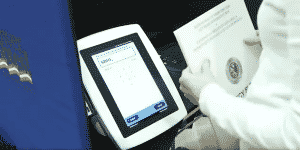The audit taking place in the state’s most populous county will not determine if any ineligible convicts cast votes—likely due to the long process that would be required to qualify them.
The forensic audit in Maricopa County cannot identify ineligible voters without verifying the eligibility of each voter and determining if each voter is compliant with the state’s requirements on U.S. citizenship, minimum age, residency, criminal convictions, and mental capacity.
Arizona did not verify the eligibility of each voter for the 2020 election because the state as well as Maricopa County rely on voters to self-certify that they are eligible to vote.
The website for the Maricopa County Recorder states: “When a person completes the [registration] form, they are stating that either they have not been convicted of a felony offense, or if they were, their right to vote has been restored.”
“The Maricopa County Recorder’s Elections Office does not require proof of the restoration of civil rights prior to processing a voter registration form. Our acceptance of the form does not constitute a verification that we agree that a person’s right to vote has been restored.”
Felons in Arizona cannot vote while they are incarcerated, on probation, or on parole. They must pay restitution before they can vote again.
There are further distinctions based on the number of felony convictions. For example, if a person were convicted of one felony offense, the right to vote can be restored automatically upon completion of the sentence. However, if a person were convicted of two or more felony offenses, the individual must petition the court for restoration of his voting rights. If the sentence involved probation, he can file for restoration as soon as it ends. If sentenced to jail time, the individual must wait until two years after the incarceration and community service are completed before filing a petition.
This process is further complicated by mail-in ballots that might have been mailed to voters who were ineligible to vote. Upon receiving the ballots in their homes, voters might have believed they were automatically eligible to vote.
How Other States Verify Voter Eligibility
Arizona is not alone in this dilemma. A recent examination by The Epoch Times of the eligibility verification process in all 50 states raised many questions as to how each state verifies that voters are eligible to vote as defined by state law.
“Elected officials are exerting minimal efforts to verify that voters are eligible to vote,” Hans A. von Spakovsky, a senior scholar at the Heritage Foundation, told The Epoch Times. “We should not allow people to self-certify their backgrounds. No one is looking at the national criminal database maintained by the FBI, and they should. Records checks are required for employment, housing, volunteer efforts, and many other activities.”
Forty-eight states have some voting restrictions tied to convictions. In two states, Maine and Vermont as well as Washington D.C., everyone votes—even while incarcerated.
In 38 states, the right to vote is basically restored when incarceration, probation, and parole are complete, although 19 states allow individuals to vote while on parole and/or probation. Seven states require some form of gubernatorial pardon and four states have other requirements such as a time delay before being eligible to vote. States have different requirements for various types of convictions as well as for the repayment of restitution and fines.
“In Connecticut, voter registrations are self-certifying and no specific check is made to verify that an individual registrant is not currently incarcerated with a felony conviction,” Gabe Rosenberg, the communications director for the Connecticut secretary of state, told The Epoch Times.
States also make minimal efforts to ensure U.S. citizenship and state, county, or precinct residency.
As in Arizona, many states’ election infrastructure is decentralized, established as a three or four tiered system filled with elected and appointed positions. Each level is independent, leaving no higher level in control, including the governor and the secretary of state, with few exceptions.
“Voter registration (in Illinois) is conducted exclusively by local election authorities, 101 county clerks, one county board of elections, and six municipal boards of election,” Matt Dietrich, the public information officer for the Illinois State Board of Elections, told The Epoch Times.



